Interview with Chris Lacey, Link Bubble and Action Launcher Developer
- Transfer

Chris Lacey is an independent lone developer who earns his living only with Android development. In this interview with androidpolice.com, he shares his opinion on the development of Android, development for it, etc.
AP: What attracted you to the development for mobile devices, Android in particular?
Chris: Before I became an application developer, I made games. Based on my interest in gadgets and technologies, I also appeared in application development. The iPhone caught my attention, but after iOS4 turned my iPhone 3g into a slow piece of plastic, I decided to choose Android.
At the end of 2011, after the release of ICS, I decided to write the first application, and that was the client for Twitter, mainly for the reason that Android simply did not have normal looking and working clients.
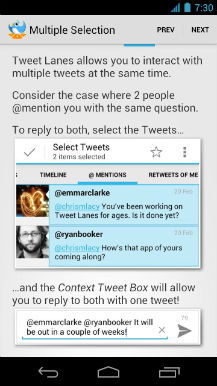
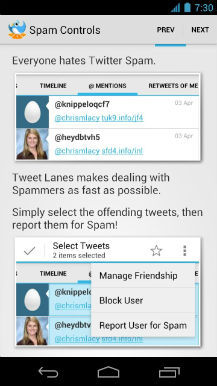
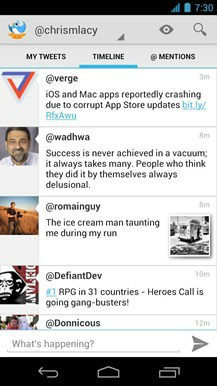
Tweet Lanes
Android development has attracted me for several reasons. Android APIs are more flexible than other mobile platforms, you can create applications that are simply impossible on other OSs. For example, with Link Bubble, I can open links from other applications in my own, load them in the background and then display them on top of another application. Cool, right?
I also liked the very idea of what I would write for the platform from Google. That number of different web APIs, conferences, a huge community of developers, programs, features, etc ... It seemed to me that Google is determined to help ordinary developers, to move forward in this technological space. I liked the idea that when I put my ideas into applications, I also move this platform forward, maybe only in the eyes of the small number of people who use them, but still.
AP: The first rule of every developer is that programs are written in order to solve some problems. What problems do you solve?
Chris:I struggle with those problems that are usually not thought of or not guessed about their existence, that is, I make the application so that when it sees how it performs its function, the user wonders how I could do it differently, because it’s so obviously. I do not invent something radically new, I just take what has long been, add my ideas and hope that someone will understand my plan.
AP: As an Android developer, what annoys / annoys / disturbs you the most in your work?
Chris: WebView (this is a system API that allows third-party applications to process web pages with a native browser, it uses Link Bubble and many other applications). In it, I came across several critical problems, everything is processed slowly ,the application crashes and you can’t do anything about it (seriously, because of the latter, people often return money for the application or leave reviews with 1 star on Google Play).
Google switched to Blink (the Google Chrome engine) (in 4.4), saying that "2014 will be the year the web changes completely for mobile devices." But so far nothing has changed, well, at least for those who do not use Chrom. Developers who need webview in applications or people who use the browser on a different engine smoke aside (if they do not have the latest version of the OS - a translator’s note).
That’s why Google is laying more and more functionality and APIs on Google Play Services. I would like that APIs like webview and some others would not be tied to the OS version, but could be updated directly through these very services so that developers using such basic functionality would not experience different problems on different OS versions.
AP: How do you think Google can better help developers?
Chris:In general, Google is doing pretty well in this regard. The developer relations group is sociable and accessible, Android Studio is a huge leap forward, and the ability to test applications through groups in GPlus by simply downloading the new apk to the Play Developer Console is also a great opportunity. The application is updated by users literally an hour or two after its publication, and not at least 4 days later, as on iOS, I do not want to seem impudent, but it would be cool if this happened even faster.
The main thing Google has not yet succeeded in, in my opinion, is Google Play itself. Finding new applications is difficult, but the same thing hangs in the tops. And it would be nice to simplify the process of monetizing applications.
AP: As a developer and as a user, what changes in Android would you like to see the most?
Chris: Permission / authority for applications. For example, when you install them (both apk and from Google Play), you see and agree to a certain number of permissions for each application (to use sensors, access to data, etc.), but this system does not manifest itself further, and just full of flaws. For example, almost all non-Nexus / Google Play devices come with a bunch of pre-installed third-party applications, which often can not be limited in actions, not removed, or even turned off. My non-operator Galaxy S4, for example, carries with it in the firmware a bunch of such stuff. There is an application called “Com2usPoker” and in turn it has access to the applications that I launch, to the information about my account, phone number, Internet connection and even more.
You will find it unacceptable that when you buy a new house, it will be clogged with hidden cameras that take you off and all the information goes inexplicably.
I have no doubt that Google probably somewhere in the agreements with manufacturers has a fad about such applications, but as a user I just want to have a setting where it will be possible to turn off each application access to something.
As a developer, I like the ability to deny access to data from the user. Link Bubble during installation (initial launch) asks about the possibility of using the location, and warns that using GPS can consume a lot of energy, I also report about this in the description of the application in the store. By the way, it would be much more convenient and understandable if applications requested access to something only when they needed it (for example, Link Bubble would ask for access to GPS only when the site asks for it). Same story with Action Launcher and its access to the dialer or contacts.
What is sad is that a similar system exists in 4.4: you can turn off access to the location from the settings, when placing the widget on the table from a non-system launcher - a request appears, there is even a menu with applications that have access to notifications, but all these menus settings and queries are scattered or appear only in certain situations. As a user and developer, I would like to see this as a clear and simple function / system setup.
AP: In your opinion, how successful are Google in the design of their own applications, and in general in the interface language (in May there was no material design)?
Chris:I love the way Google apps come in. In general, I'm not a fan of the standard look of Android Holo, especially its dark version. The applications designed in it seem to me completely heartless and simple or something ...


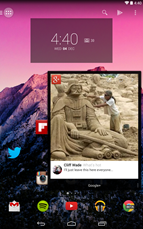
AP: If you look, the price of most applications on Google Play does not exceed $ 2. Your applications (not including discounts) exceed this bar, Action Launcher - $ 4, Link Bubble - $ 5 also with a notification that in the future the price can only increase. Why is that?
Chris: First, I don’t agree with you right away. If you look at the category of the most bought in GPlay, you can see that if you separate the games, then the software just costs more than $ 2. With Action Launcher, I decided - well, since the market completely agrees to buy good software for $ 4, then why am I worse?
With Link Bubble, it seemed to me that he was worth another dollar from above. For the money, this program has largely changed my principle of using the device, in some ways it can be compared with a new phone or OS update.
I wrote to Artyom (the founder of AndroidPolice.com) in PM about the fact that I was going to increase the price of Link Bubble at the start, by the way I thought to do it after launch, but I never spoke about it publicly. Although we will be honest, we all constantly think about a bunch of different things. And by the way, at the moment I'm not going to raise the price in the future.
The reaction to the Link Bubble price was mostly positive. The launch went well. There were people who are dissatisfied with the price of $ 5 and consider it too high for software. But I don’t, my program helps you use your device / improves this experience, I’m not homeless, I don’t need money so much and I’m not one of those developers who release stupid applications like Virus Shield or Flappy Bird Saga on Google Play, I do not steal of your data, I honestly made a program and it costs half as much as a ticket for Tor 2 (and this, if you still don’t think about popcorn and soda and in-app purchases) (note - this is probably a reference to candy crash saga and purchases in it) and the application also has a free version showing the full capabilities.
Well, what to say, by the end of the day I had thoughts about what is still important - the price should be such that the application pays for itself and brings maximum profit, whether I managed to solve this problem or not - time will tell.
AP: What circumstances should affect the decrease / increase in prices for new / current applications?
Chris: Well, I don’t think that I am transferring for $ 4.99 like Link Bubble, but it depends on the application itself, as I said earlier. In addition, I am not opposed to lower prices, if there is a reason.
AP: You often ask your subscribers what they would like to change or add to your applications. Do you follow their advice? Does public / consumer opinion influence the development process?
Chris:The presence of a large number of people from whom you can get an instant (well, almost) response helped me to solve all sorts of small but important things like “what settings to use by default”, etc. Basically, I write applications for myself, and accordingly for people with a similar principle of use. It probably sounds strange, but I just made a mistake in the past, trying to do what I thought the audience needed, and ended up with a product that I myself do not want to use, and, accordingly, working on it, which is not very good.
AP: Do you communicate with XDA users (xda-developers.com)? If so, how different is the interaction with them from that of your subscribers on social networks (Twitter / G +)?
Chris:I seem to have an XDA account, but no, I don’t go there at all. The hour spent on the forum for me is equal to the hour that I could spend on the code. It seems to me that the fact that I freely answer everyone in social networks is quite enough.
Probably my absence on XDA was also influenced by the fact that I'm not at all interested in tweaks, custom firmware, and other things that they mostly discuss there. I never rutted my devices, did not put custom or xposed, etc.
AP: Are you already working or are you planning for something new?
Chris:I have a ready-made application that I could release at least tomorrow, but there are a couple of reasons why I still think what to do with it. It was not written as a project, but rather in the form of an experiment, I use it every day at home. In fact, I was going to quickly write it for one function I needed and release it, but then the idea grew and I think about how far it all goes. Most likely it will all end with the fact that some Friday I just take it and release it for no particular reason, and see if it comes in.
One of these days I had such a funny moment when a terribly cool idea came to my mind for an application, the prototype of which I had been doing for 18 months, it will be very useful, but I don’t even know when I will find time to finalize it to a full-fledged application, because now I'm very busy.
Time seems to be my enemy.
AP: So you have succeeded as an independent lone developer, have you considered options for working in a company?
Chris: Yes, there were offers from both large and small companies and teams. In short, they all boiled down to one thing - I (and therefore my family) should move to the Coast (San Francisco Bay) from Australia. This is not a very common thing for us, my wife has a career here, my applications sell well too, and I can do what I like, we have relatives and friends here, in general, moving can’t be called a particularly advantageous situation.
But at the same time, working alone is difficult, primarily as a person. I rarely contact industry co-workers or very rarely work with someone on a team on some kind of project. I have already said that there were different proposals, and now at such moments you start drooling on projects that you had the opportunity to work on, what tens of millions of people will see.
If I were offered to go to a team doing something really cool, just moving to some country with easily accessible chili fries and Buffalo chicken wings, it would be hard to refuse, that's for sure.
AP: What do you think about iOS?
Chris:Recently, I finally began to use my iPad Mini Retina a little for the first time since I bought it at the start of sales. IOS has a lot of good things to learn. Basically, this is the speed and smoothness of the animation throughout the system, Android is still not so smooth, despite all the efforts of Google. For example, my Nexus 5 sometimes thinks before deploying a previously launched application, which I didn’t notice on the same iPad (it means the animation of the application’s deployment most likely).
Although, for example, I can’t understand why in version 7 of the OS there is still no way to choose a standard browser, mail client, etc. And still very annoying is the lack of the ability to quickly share any link from one application to another.
On iPad, I use Twitter and Google+ and here I miss my Link Bubble. After six months of using it, I wait with pain for the browser to load again and again during the opening of a new link.
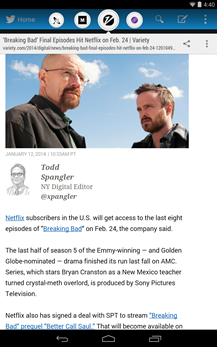
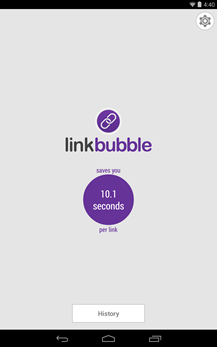

Link Bubble
AP: What do you think of the flagship devices of 2014?
Chris: Nothing, I got bored with all these feature updates every year, I’m tired of the trend of increasing the flagship of each company. The Galaxy S2 had a 4.3-inch display, but after three iterations, it grew to 5.1. How will this end?
What I say sounds much better than it is realized. I would like to see progress in those industries where smartphones are doing poorly: I want it to discharge slowly; I want a screen that cannot be simply broken / scratched, for example by sitting on it; I want a camera that will take a good photo the first time.
AP: Are you interested in other platforms or types of devices associated with them (Glass, Fire TV, Android Wear)?
Chris: As someone who has been making games for consoles for over 10 years, I'm very interested in TVs. For the last three years I have been waiting for some of the manufacturers (Apple / Google) to finally break into my living room and occupy it, but so far this has not happened.
I would like to improve the TV interface in some way, but to be honest, I don’t have the means and capabilities to do this, let the guys from the Google ATAP group or Amazon or someone else do it better.
I have some interesting ideas for Android Wear, but until I see the SDK and the finished device in my hand, I can not say anything.
AP: Thanks for the answers, Chris!
You can follow Chris Lacey on G + and Twitter , and find his apps on Google Play .
